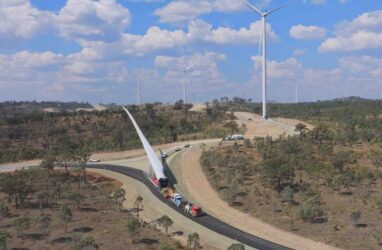Feed aggregator
Europe baked in ‘extreme heat stress’ pushing temperatures to record highs
Europeans are dying from hot weather 30% more than they did two decades ago, report finds
Scorching weather has baked Europe in more days of “extreme heat stress” than its scientists have ever seen.
Heat-trapping pollutants that clog the atmosphere helped push temperatures in Europe last year to the highest or second-highest levels ever recorded, according to the EU’s Earth-watching service Copernicus and the World Meteorological Organization (WMO).
Continue reading...Australia Market Roundup: Capacity Investment Scheme targets 6 GW of renewables in May, ACCU issuance increases
RayGen raises $51m in round led by US oil giant and state-owned VC fund
The post RayGen raises $51m in round led by US oil giant and state-owned VC fund appeared first on RenewEconomy.
Australia’s biggest wind and solar auction set for May, with focus on coal-heavy NSW
The post Australia’s biggest wind and solar auction set for May, with focus on coal-heavy NSW appeared first on RenewEconomy.
Our climate change record is strong, minister says
A radical British politics rooted in nature is spreading – and the establishment doesn’t like it | John Harris
From right to roam to anger over polluted rivers, a new breed of activists is pushing back against environmental destruction
Something very interesting is happening in the UK, to do with nature, the expanses of land we think of as the countryside, and where all those things sit in our collective consciousness. The change has probably been quietly afoot for 20 or 30 years. Now, it suddenly seems to be blurring over from the cultural sphere into our politics, with one obvious consequence – the belated entry into the national conversation of issues that have long been pushed to the margins, from land access and ownership to the shocking condition of our rivers.
The prevailing British attitude to nature has long been in an equally messed-up state. From the 1600s onwards, endless enclosure acts pushed people off the land and seeded the idea of the countryside as somewhere largely out of bounds. Britain’s rapid industrialisation only accelerated the process. And despite occasional cultural and political tilts in the opposite direction – the bucolic visions of the 18th- and 19th-century Romantics, the mass trespass movement of the 1930s – most of us now show the signs of that long story of loss and estrangement.
Continue reading...Ladybirds are meant to be lucky, but lucky for who?
Fly away home… You can have too much of a good thing
‘Look, a ladybird!’ This was how it started. My family were staying the night in a bed and breakfast near friends in rural England – we had driven through a landscape the colour of butter to park under a hillside upon which the shadows of clouds passed like curtains closing. I was medicated, pleasantly, can you tell, in a hangover from the most painful migraine of my life, and the clouds reminded me of the visual aura that flickers across your vision just before the headache begins. We put our bag on a chair, and there, inside the window frame, was a ladybird. And then, look, there was another one. The children gathered, by the window ready to be enchanted.
A group of ladybirds is called a “loveliness”, which, to me, sounds suspicious. Sounds problematic even. As if they have named themselves. A “conspiracy” of lemurs, that’s a good one, implies darkness, intelligence. A “bloat” of hippos, relatable. A “destruction” of wild cats, you’ve got a whole story there, beginning, middle, end. But a “loveliness”, please. Perhaps it’s my own must-work-on-it tendency towards tall poppy syndrome, perhaps I am inordinately disgusted by the ladybirds’ cloying self-satisfaction – I find the term embarrassing. However, there it was, a loveliness, crawling all over the window frame.
Continue reading...Cote d’Ivoire asks Rabobank to suspend carbon credit activities in country amid numerous allegations
Major wind farm withdrawn after more planning delays, downsizing, name changes and fierce opposition
The post Major wind farm withdrawn after more planning delays, downsizing, name changes and fierce opposition appeared first on RenewEconomy.
Chris Packham joins environmental activists in mock funeral procession
BBC nature presenter delivers eulogy at protest aimed at ‘scaring people a bit’ about the loss of biodiversity in the UK
The BBC nature presenter Chris Packham has joined hundreds of environmental activists in a mock funeral procession for nature to spotlight biodiversity loss in the UK.
The procession aimed to sound “code red for nature” and highlight the UK’s position as “one of the most nature-depleted countries in the world”, organisers said. It was planned to coincide closely with Earth Day on 22 April.
Continue reading...Developer, local council sign carbon trading deal to protect 250k hectares of forested land in Tanzania
Sunak has ‘set Britain back’ on net zero, says UK’s climate adviser
Chris Stark, head of the Climate Change Committee, says Tories’ decision to dilute key green policies has had huge diplomatic impact
Rishi Sunak has given up Britain’s reputation as a world leader in the fight against the climate crisis and has “set us back” by failing to prioritise the issue in the way his predecessors in No 10 did, the government’s green adviser has warned.
Chris Stark, the outgoing head of the Climate Change Committee (CCC), said that the prime minister had “clearly not” championed the issue following a high-profile speech last year in which he made a significant U-turn on the government’s climate commitments. The criticism comes after Sunak was accused of trying to avoid scrutiny of Britain’s climate policies by failing to appoint a new chair of the CCC.
Continue reading...A heedless dash for net zero will waste cash and, later, votes | Phillip Inman
Keir Starmer must learn from the Tories’ failures and ensure green projects are well planned and resourced
In the energetic pursuit of net zero, billions of pounds could be squandered needlessly. That’s the lesson from countries as diverse as Italy, the US and UK, where the rush to subsidise green projects suggests vast sums are at risk. Worse, they could be lining the pockets of multinational businesses and City financiers.
In the UK, 14 years of austerity has left the public sector struggling to make coherent, strategic decisions. When a decision is finally made, it is a panic measure that quickly unravels. The fallout could be that voters become disenchanted with green tech, especially if the dash for net zero leads to higher taxes and higher borrowing while early adopters unwittingly pay for costly mistakes.
Continue reading...Guyana first small island state to report biennial climate action progress under Paris Agreement
Sunak has set us back, says climate watchdog head
Scientists’ experiment is ‘beacon of hope’ for coral reefs on brink of global collapse
Recordings of healthy fish are being transmitted to attract heat-tolerant larvae back to degraded reefs in the Maldives
An underwater experiment to restore coral reefs using a combination of “coral IVF” and recordings of fish noises could offer a “beacon of hope” to scientists who fear the fragile ecosystem is on the brink of collapse.
The experiment – a global collaboration between two teams of scientists who developed their innovative coral-saving techniques independently – has the potential to significantly increase the likelihood that coral will repopulate degraded reefs, they claim.
Continue reading...‘Dirty secret’: insiders say UK water firms knowingly break sewage laws
Exclusive: Whistleblowers point to broader sewage scandal, with wastewater systems manipulated to divert sewage
Whistleblowers say UK water companies are knowingly failing to treat legally required amounts of sewage, and that some treatment works are manipulating wastewater systems to divert raw sewage away from the works and into rivers and seas.
It is well known that water companies are dumping large volumes of raw sewage into rivers and seas from storm overflows but an investigation by the Guardian and Watershed Investigations reveals that the industry’s “dirty secret” is bigger, broader and deeply systemic.
Continue reading...





